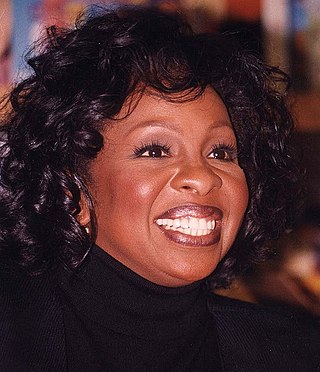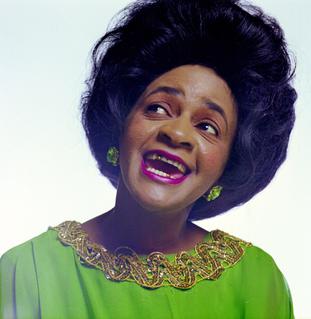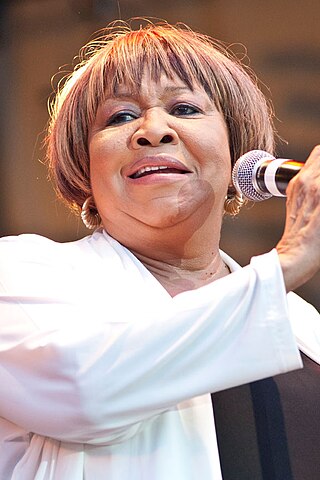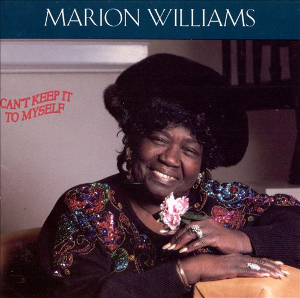
Whitney Elizabeth Houston was an American singer and actress. Known as "the Voice", she is one of the most awarded entertainers and one of the best-selling music artists of all time, with sales of over 220 million records worldwide. Houston's crossover appeal on the popular music charts and her performances influenced the breaking down of gender and racial barriers, as well as popular culture. Known for her vocal delivery and distinctive timbre, Houston was ranked second by Rolling Stone on its list of the greatest singers of all time. Her life and career have been the subject of multiple documentaries and television specials.

Aretha Louise Franklin was an American singer, songwriter and pianist. Honored as the "Queen of Soul", she was twice named by Rolling Stone magazine as the greatest singer of all time.

Jamesetta Hawkins, known professionally as Etta James, was an American singer and songwriter who performed in various genres, including gospel, blues, jazz, R&B, rock and roll, and soul. Starting her career in 1954, she gained fame with hits such as "The Wallflower", "At Last", "Tell Mama", "Something's Got a Hold on Me", and "I'd Rather Go Blind". She faced a number of personal problems, including heroin addiction, severe physical abuse, and incarceration, before making a musical comeback in the late 1980s with the album Seven Year Itch.

Delores LaVern Baker was an American rhythm and blues singer who had several hit records on the pop charts in the 1950s and early 1960s. Her most successful records were "Tweedle Dee" (1955), "Jim Dandy" (1956), and "I Cried a Tear" (1958).

Gladys Maria Knight, known as the "Empress of Soul", is an American singer. A ten-time Grammy Award-winner, Knight recorded hits through the 1960s, 1970s, and 1980s with her family group Gladys Knight & the Pips, which included her brother Merald "Bubba" Knight and cousins William Guest and Edward Patten.

Mahalia Jackson was an American gospel singer, widely considered one of the most influential vocalists of the 20th century. With a career spanning 40 years, Jackson was integral to the development and spread of gospel blues in black churches throughout the U.S. During a time when racial segregation was pervasive in American society, she met considerable and unexpected success in a recording career, selling an estimated 22 million records and performing in front of integrated and secular audiences in concert halls around the world.

Sister Rosetta Tharpe was an American singer, songwriter and guitarist. She gained popularity in the 1930s and 1940s with her gospel recordings, characterized by a unique mixture of spiritual lyrics and electric guitar. She was the first great recording star of gospel music, and was among the first gospel musicians to appeal to rhythm and blues and rock and roll audiences, later being referred to as "the original soul sister" and "the Godmother of rock and roll". She influenced early rock-and-roll musicians including Little Richard, Johnny Cash, Carl Perkins, Chuck Berry, Elvis Presley, Jerry Lee Lewis, and also later guitarists, such as Eric Clapton.

Shirley Ann Caesar-Williams, nee Caesar,, known professionally as Shirley Caesar, is an American gospel singer. Her career began in 1951, when she signed to Federal Records at the age of 12. Throughout her seven decade career, Caesar has often been referred to as the "First Lady of Gospel Music", and "The Queen of Gospel Music". She has won eleven Grammy Awards, fifteen Dove Awards, and fourteen Stellar Awards.

Emily Drinkard, known professionally as Cissy Houston, was an American soul and gospel singer. Born in Newark, New Jersey, Houston began singing with three of her siblings in the family gospel group, The Drinkard Singers. By the early 1960s, Houston began a career as a session vocalist for several secular musicians in the rhythm and blues, soul, rock and roll, pop and rock genres. After initially joining her nieces' group the Gospelaires for a session with Ronnie Hawkins in 1961, Houston gradually took control of the group, which revamped into "The Group" with Houston, niece Sylvia Shemwell, Myrna Smith and teenager Estelle Brown. She eventually founded the girl group The Sweet Inspirations with Shemwell, Smith and Brown in 1967 and that year signed a contract with Atlantic Records where, with Houston as lead singer, they would record four albums before Houston departed for a solo career in 1970. Her best known solo singles include the top 20 R&B chart single, "I'll Be There" and the top 5 dance single, "Think It Over". Her solo career culminated with two Grammy Award wins, both in the Traditional Gospel Album category.

Clara Mae Ward was an American gospel singer who achieved great artistic and commercial success during the 1940s and 1950s, as leader of the Famous Ward Singers. A gifted singer and arranger, Ward adopted the lead-switching style, previously used primarily by male gospel quartets, creating opportunities for spontaneous improvisation and vamping by each member of the group, while giving virtuoso singers such as Marion Williams the opportunity to perform the lead vocal in songs such as "Surely, God Is Able", "How I Got Over" and "Packin' Up".

Dennis Edwards Jr. was an American soul and R&B singer who was best known as the frontman in The Temptations for Motown Records. Edwards joined the Temptations in 1968, replacing David Ruffin and sang with the group from 1968 to 1976, 1980 to 1984, and 1987 to 1989. In the mid-1980s, he launched a solo career, recording the 1984 hit single "Don't Look Any Further". Until his death, Edwards was the lead singer of The Temptations Review, a Temptations splinter group.

The Davis Sisters of Philadelphia, PA were an American gospel group founded by Ruth Davis and featuring her sisters Thelma, Audrey, Alfreda and Edna. Imogene Greene joined the group in 1950, and was later replaced by Jackie Verdell when Greene left to join the Caravans.

Willie Mae Ford Smith was an American musician and Christian evangelist instrumental in the development and spread of gospel music in the United States. She grew up singing with her family, joining a quartet with her sisters. Later she became acquainted with Thomas A. Dorsey, the "Father of Gospel Music", when he co-founded the National Convention of Gospel Choirs and Choruses in 1932. Smith started the St. Louis chapter and became the director of the national organization's Soloist's Bureau, training up and coming singers in the gospel blues style. She became known for her nurturing temperament, leading to her commonly being called "Mother Smith" by those within her musical circle. For a decade she traveled ceaselessly tutoring, singing, and preaching in churches and at revivals. Her appearances were renowned for being intensely moving spiritual experiences.

Sister Inez Andrews, born Inez McConico and better known as Inez Andrews, was an American gospel singer. Her soaring, wide-ranging voice—from contralto croon to soul-wrenching wail—made her a pillar of gospel music. The Chicago Tribune stated that "Andrews' throaty contralto made her low notes thunder, while the enormous range of her instrument enabled her to reach stratospheric pitches without falsetto". Her dramatic delivery made her a charismatic presence in church and on stage."

Sarah Dash was an American singer. She first appeared on the music scene as a member of Patti LaBelle & The Bluebelles. Dash was later a member of Labelle, and worked as a singer, session musician, and sidewoman for The Rolling Stones, and Keith Richards.

The Sweet Inspirations are an American R&B girl group from Newark, New Jersey, founded by Cissy Houston, mostly known for their work as backup singers on studio recordings for other R&B and rock artists but also a Grammy-nominated recording act in their own right.
Anthony Heilbut is an American writer, and a Grammy Award winning record producer of gospel music. He is noted for his biography of Thomas Mann, and is also a two-time recipient of the Grand Prix du Disque.

Mavis Staples is an American rhythm and blues and gospel singer and civil rights activist. She rose to fame as a member of her family's band The Staple Singers, of which she is the last surviving member. During her time in the group, she recorded the hit singles "I'll Take You There" and "Let's Do It Again". In 1969, Staples released her self-titled debut solo album.

Roseanna Elizabeth Vitro is a jazz singer and teacher from Arkansas.

Can't Keep It to Myself is an album by the American gospel singer Marion Williams, released in 1993. It was Williams's last album. A few months prior to the release of the album, Williams had become the first singer to win a MacArthur Award.



















